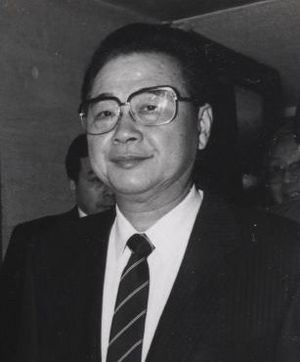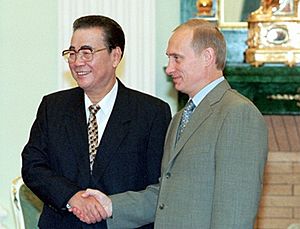Li Peng facts for kids
Quick facts for kids
Li Peng
|
|||||||||||||||||||
|---|---|---|---|---|---|---|---|---|---|---|---|---|---|---|---|---|---|---|---|
|
李鹏
|
|||||||||||||||||||

Li in 1992
|
|||||||||||||||||||
| 4th Premier of the People's Republic of China | |||||||||||||||||||
| In office 25 March 1988 – 17 March 1998 Acting: 24 November 1987 – 25 March 1988 |
|||||||||||||||||||
| President | Yang Shangkun Jiang Zemin |
||||||||||||||||||
| Vice Premier |
Cabinet I (1988–93)
Cabinet II (1993–98)
|
||||||||||||||||||
| Leader | Deng Xiaoping Jiang Zemin |
||||||||||||||||||
| Preceded by | Zhao Ziyang | ||||||||||||||||||
| Succeeded by | Zhu Rongji | ||||||||||||||||||
| 7th Chairman of the Standing Committee of the National People's Congress | |||||||||||||||||||
| In office 15 March 1998 – 15 March 2003 |
|||||||||||||||||||
| Leader | Jiang Zemin (Paramount leader) |
||||||||||||||||||
| Preceded by | Qiao Shi | ||||||||||||||||||
| Succeeded by | Wu Bangguo | ||||||||||||||||||
| Vice Premier of the People's Republic of China | |||||||||||||||||||
| In office 6 June 1983 – 24 November 1987 Serving with Wan Li, Yao Yilin, Tian Jiyun
|
|||||||||||||||||||
| Premier | Zhao Ziyang | ||||||||||||||||||
| Personal details | |||||||||||||||||||
| Born | 20 October 1928 Shanghai French Concession |
||||||||||||||||||
| Died | 22 July 2019 (aged 90) Beijing, China |
||||||||||||||||||
| Political party | Chinese Communist Party (1945–2019) | ||||||||||||||||||
| Spouse |
Zhu Lin
(m. 1958) |
||||||||||||||||||
| Children | Li Xiaopeng (son) Li Xiaolin (daughter) Li Xiaoyong (son) |
||||||||||||||||||
| Parents | Li Shuoxun (father) Zhao Juntao (mother) |
||||||||||||||||||
| Alma mater | Moscow Power Engineering Institute | ||||||||||||||||||
| Profession | Politician Hydroelectric engineer |
||||||||||||||||||
| Chinese name | |||||||||||||||||||
| Simplified Chinese | 李鹏 | ||||||||||||||||||
| Traditional Chinese | 李鵬 | ||||||||||||||||||
| Literal meaning | Li (surname 李) Peng (giant bird in Chinese mythology) |
||||||||||||||||||
|
|||||||||||||||||||
Li Peng (Chinese: 李鹏; pinyin: Lǐ Péng; 20 October 1928 – 22 July 2019) was an important Chinese politician. He served as the fourth Premier of the People's Republic of China from 1987 to 1998. This role is like being the head of the government. After that, he became the Chairman of the Standing Committee of the National People's Congress from 1998 to 2003. This was China's top law-making body.
For most of the 1990s, Li Peng was a very powerful figure in the Communist Party of China. He was second only to the Party's top leader, Jiang Zemin. He stayed on the Party's main decision-making committee until he retired in 2002.
Li Peng's father was an early Communist revolutionary who was executed. Later, Li was raised by Zhou Enlai, a very important Communist leader, and Zhou's wife. Li studied engineering in the Soviet Union and worked in China's power industry. He rose through political ranks and became Premier in 1987.
As Premier, Li Peng was a key figure in the Chinese government during the Tiananmen Square protests of 1989. He supported the use of force to end the demonstrations. He declared martial law and, with other leaders, ordered the military action against student protesters. This event led to many deaths. Li Peng favored a more traditional approach to China's economy. He died in Beijing at the age of 90.
Contents
Early Life and Education
Li Peng was born as Li Yuanpeng in Shanghai French Concession. His family originally came from Chengdu, Sichuan. His father, Li Shuoxun, was one of the first members of the Chinese Communist Party. His mother, Zhao Juntao, was also an early Communist.
In 1931, Li's father was captured and executed by the Kuomintang, a rival political party. Li met Deng Yingchao, the wife of senior Communist leader Zhou Enlai, in 1939. She took him to meet Zhou. In 1941, when Li was 12, Zhou sent him to Yan'an, a Communist base. Li studied there until 1945. At 17, in 1945, Li joined the Chinese Communist Party.
Studying in the Soviet Union
In 1941, Li Peng started studying at the Yan'an Institute of Natural Science. In 1948, he was sent to the Moscow Power Engineering Institute in the Soviet Union. He specialized in hydroelectric engineering. He graduated in 1954. While in the Soviet Union, Li led the Chinese Students Association there.
Career in Power and Politics
When Li returned to China in 1955, the Communist Party was in control. He began working in the power industry in Northeast China. He started in technical roles and then moved into management. During the Cultural Revolution, he moved to Beijing to lead the city's power bureau.
He helped build important power plants, like the Tuhe Powerplant in Tangshan. In 1976, he led efforts to restore power after the devastating Tangshan earthquake.
Rising in Government
Li's political career advanced quickly after Deng Xiaoping became China's leader in the late 1970s. Between 1979 and 1983, he served as the Vice-Minister and then Minister of Power. From 1982 to 1983, he was also the vice-minister of Water Conservancy and Power. His quick rise was partly due to the support of an older Party leader, Chen Yun.
In 1982, Li joined the Central Committee of the Chinese Communist Party. This is a key group in the Party. In 1985, he became the minister of the State Education Commission. He was also elected to the Politburo of the Chinese Communist Party and the Party Secretariat. In 1987, Li became a member of the very powerful Politburo Standing Committee of the Chinese Communist Party.
Time as Premier
Becoming Premier
In November 1987, Li became the acting Premier after Zhao Ziyang was promoted. He was officially elected Premier in March 1988. This was a big step for him. Li's promotion was partly due to changes in the Party leadership.
During the 1980s, China faced many challenges. These included political disagreements, social issues, and rising prices. Li focused on these problems and took an active role in discussions about how fast China should change its economy. He believed in stronger government control over the economy.
Tiananmen Square Protests
The Tiananmen Square protests of 1989 started after the death of former Party leader Hu Yaobang. Many people believed he was removed from his position for supporting more open policies. Students in Beijing began demonstrations for economic and political changes. These protests grew into a large movement. Protests also happened in other Chinese cities.
Some of the protests were against the wealth of children of high-ranking officials. People felt these officials' children gained wealth unfairly. Li Peng's family was sometimes mentioned in these discussions.
An article in the People's Daily newspaper on April 26, 1989, called the demonstrations "turmoil." This angered the protesters and made their demands stronger. Li Peng refused to negotiate with the protesters. He became one of the officials most disliked by them.
Li Peng strongly supported using force to end the protests. After gaining support from other leaders, he declared martial law in Beijing on May 20, 1989. The protests were ended by the military on June 3–4. Many people died during this event. Li later said the crackdown was important for the future of Communism in China.
Staying in Power

Even though the Tiananmen crackdown was a difficult event for China's image, Li Peng remained powerful. Leaders believed that removing him would suggest they had made mistakes. By keeping him in a high position, China showed it was stable and united.
After the protests, Li led a program to slow economic growth and control prices. He aimed to bring more economic control back to the government. He also increased taxes on some industries.
In 1993, Li had a heart attack. He started to lose some influence to Zhu Rongji, who was a strong supporter of economic changes. Li was reappointed Premier in 1993, but Zhu Rongji eventually took over as Premier in 1998.
During his time as Premier, Li started two very large projects. He began the construction of the Three Gorges Dam in 1994. He also started preparations for the Shenzhou Manned Space Program. Both projects were very expensive and caused much discussion in China and worldwide.
Chairman of the National People's Congress
Li remained Premier until 1998. After his second term, he became the chairman of the National People's Congress. This position was mostly ceremonial. He focused much of his time on the Three Gorges Dam, which he considered his life's work. His interest in the dam showed his background as an engineer.
Later Life and Legacy
After retiring in 2003, Li still had some influence. However, his influence decreased over time. He was often linked to discussions about corruption, especially concerning his family. His public image was strongly connected to the Tiananmen crackdown. Because of this, he was not popular with many Chinese people.
Li spent much of the 1990s expanding a large energy company, State Power Corporation of China. This company was run by his relatives. Some people accused him of turning China's energy industry into a "family business." This company controlled a large part of China's energy. After Li left government, the Chinese government divided his energy company into five smaller ones.
In 2010, Li's autobiography, The Critical Moment – Li Peng Diaries, was published. It covered his actions during the Tiananmen Square protests of 1989. Reviewers said it tried to reduce his responsibility for the crackdown. Li Peng made his last public appearance in 2017.
Li Peng died on July 22, 2019, at the age of 90. He was receiving medical treatment in Beijing. His funeral was held on July 29, 2019.
Family Life
Li Peng was married to Zhu Lin (Chinese: 朱琳). They had three children: Li Xiaopeng, Li Xiaolin, and Li Xiaoyong. Li Xiaoyong is married to Ye Xiaoyan, whose grandfather was a Communist veteran.
Li's children benefited from his high position. Two of his children, Li Xiaopeng and Li Xiaolin, managed large electricity companies in China. Some state media questioned whether it was good for China to have such powerful family-run businesses. Li Xiaopeng later became a politician in Shanxi and then Minister of Transport. Li Xiaolin was a chief executive at a power company before moving to a different role.
Honors and Awards
Li Peng received several awards from different countries:
 Cameroon: Order of Merit (1997)
Cameroon: Order of Merit (1997) Morocco: Order of Ouissam Alaouite (1995)
Morocco: Order of Ouissam Alaouite (1995) Pakistan: Nishan-e-Pakistan (1999)
Pakistan: Nishan-e-Pakistan (1999) Peru: Order of the Sun of Peru (1995)
Peru: Order of the Sun of Peru (1995) Russia: Medal of Pushkin (2007)
Russia: Medal of Pushkin (2007) Tunisia: Order of the Republic (1984)
Tunisia: Order of the Republic (1984) Venezuela: Order of the Liberator (1996)
Venezuela: Order of the Liberator (1996) Yugoslavia: Order of the Yugoslav Star (2000)
Yugoslavia: Order of the Yugoslav Star (2000)
See also
 In Spanish: Li Peng para niños
In Spanish: Li Peng para niños
- Politics of the People's Republic of China
- History of the People's Republic of China (1989-2002)
- Premier of the PRC
 | Leon Lynch |
 | Milton P. Webster |
 | Ferdinand Smith |

